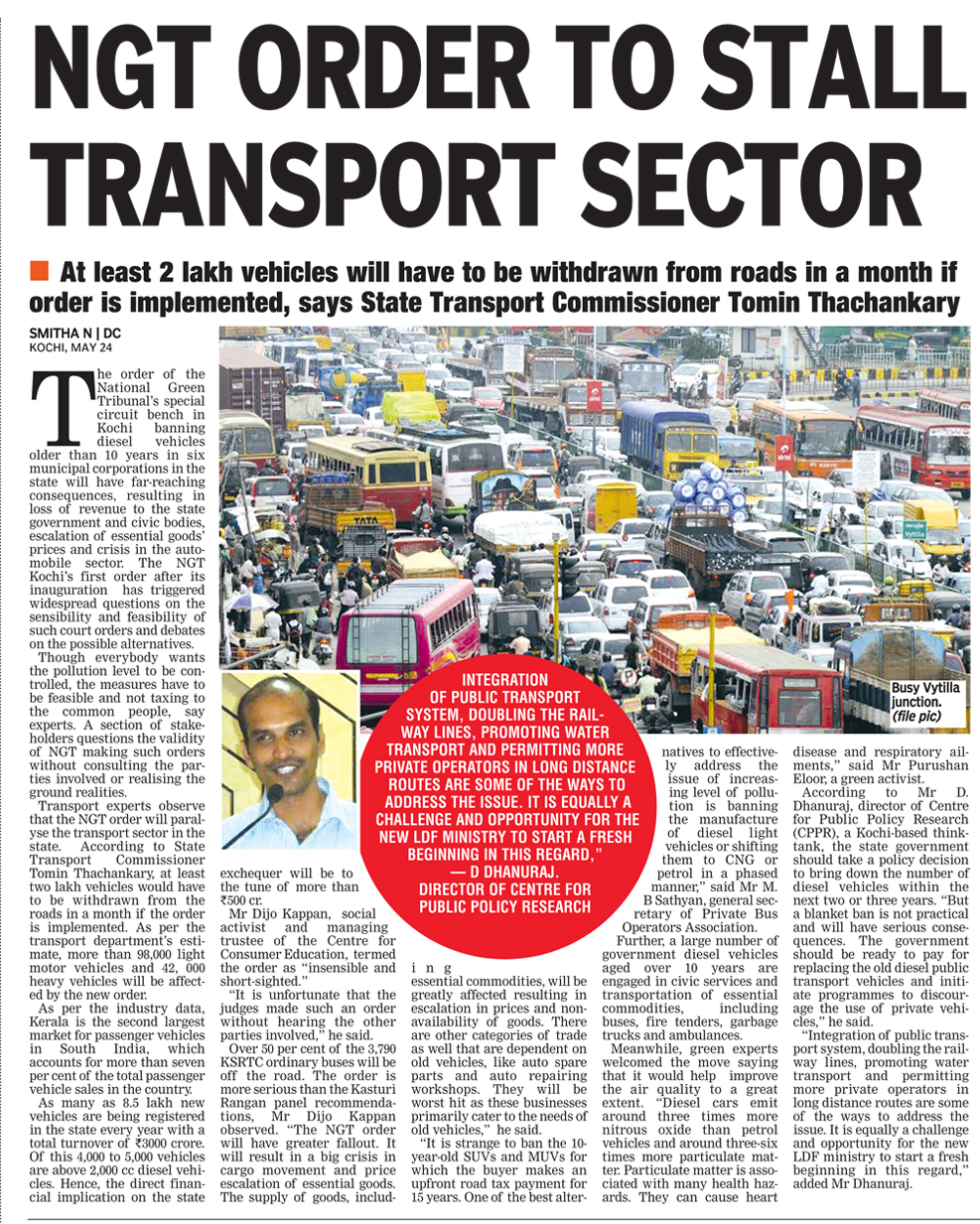CPPR in the News

More than one lakh voters opt for NOTA in Kerala Polls; The New Indian Express, 23rd May 2016
May 24, 2016
Five tasks that await the new LDF government in Kerala; livemint, 23rd May 2016
May 27, 2016National Green Tribunal order to stall transport sector in Kerala; Deccan Chronicle, 25th May 2016
National Green Tribunal order to stall transport sector in Kerala
KOCHI: The order of the National Green Tribunal’s special circuit bench in Kochi banning diesel vehicles older than 10 years in six municipal corporations in the state will have far-reaching consequences, resulting in loss of revenue to the state government and civic bodies, escalation of essential goods’ prices and crisis in the automobile sector. The NGT Kochi’s first order after its inauguration has triggered widespread questions on the sensibility and feasibility of such court orders and debates on the possible alternatives.
Though everybody wants the pollution level to be controlled, the measures have to be feasible and not taxing to the common people, say experts. A section of stakeholders questions the validity of NGT making such orders without consulting the parties involved or realising the ground realities. Transport experts observe that the NGT order will paralyse the transport sector in the state.
According to State Transport Commissioner Tomin Thachankary, at least two lakh vehicles would have to be withdrawn from the roads in a month if the order is implemented. As per the transport department’s estimate, more than 98,000 light motor vehicles and 42, 000 heavy vehicles will be affected by the new order.
As per the industry data, Kerala is the second largest market for passenger vehicles in South India, which accounts for more than seven per cent of the total passenger vehicle sales in the country. As many as 8.5 lakh new vehicles are being registered in the state every year with a total turnover of Rs 3000 crore. Of this 4,000 to 5,000 vehicles are above 2,000 cc diesel vehicles. Hence, the direct financial implication on the state exchequer will be to the tune of more than Rs 500 cr.
Mr Dijo Kappan, social activist and managing trustee of the Centre for Consumer Education, termed the order as “insensible and short-sighted.” “It is unfortunate that the judges made such an order without hearing the other parties involved,” he said. Over 50 per cent of the 3,790 KSRTC ordinary buses will be off the road. The order is more serious than the Kasturi Rangan panel recommendations, Mr Dijo Kappan observed.
“The NGT order will have greater fallout. It will result in a big crisis in cargo movement and price escalation of essential goods. The supply of goods, including essential commodities, will be greatly affected resulting in escalation in prices and non-availability of goods. There are other categories of trade as well that are dependent on old vehicles, like auto spare parts and auto repairing workshops. They will be worst hit as these businesses primarily cater to the needs of old vehicles,” he said.
“It is strange to ban the 10-year-old SUVs and MUVs for which the buyer makes an upfront road tax payment for 15 years. One of the best alternatives to effectively address the issue of increasing level of pollution is banning the manufacture of diesel light vehicles or shifting them to CNG or petrol in a phased manner,” said Mr M. B Sathyan, general secretary of Private Bus Operators Association.
Further, a large number of government diesel vehicles aged over 10 years are engaged in civic services and transportation of essential commodities, including buses, fire tenders, garbage trucks and ambulances. Meanwhile, green experts welcomed the move saying that it would help improve the air quality to a great extent. “Diesel cars emit around three times more nitrous oxide than petrol vehicles and around three-six times more particulate matter.
Particulate matter is associated with many health hazards. They can cause heart disease and respiratory ailments,” said Mr Purushan Eloor, a green activist. According to Mr D. Dhanuraj, director of Centre for Public Policy Research (CPPR), a Kochi-based think-tank, the state government should take a policy decision to bring down the number of diesel vehicles within the next two or three years.
“But a blanket ban is not practical and will have serious consequences. The government should be ready to pay for replacing the old diesel public transport vehicles and initiate programmes to discourage the use of private vehicles,” he said. “Integration of public transport system, doubling the railway lines, promoting water transport and permitting more private operators in long distance routes are some of the ways to address the issue. It is equally a challenge and opportunity for the new LDF ministry to start a fresh beginning in this regard,” added Mr Dhanuraj.


